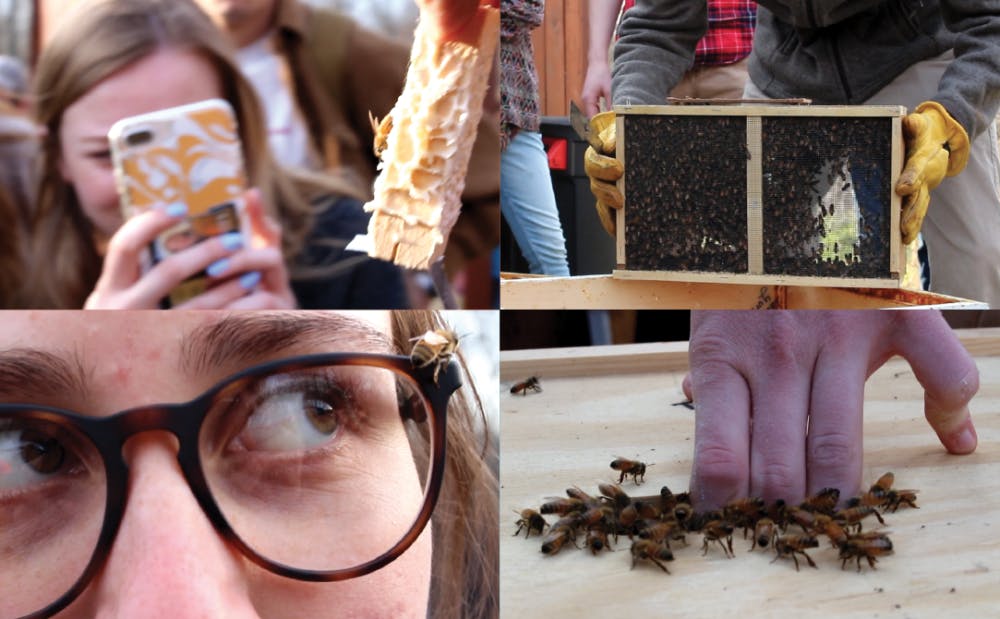As the sun rose early Tuesday morning, four Miami students retrieved an unusual package from the Oxford post office. After arriving the students received a 3-pound box made of plywood and mesh siding, containing nearly 10,500 Italian honey bees.
The students are members of the Miami Apiculture Society, the university's first student run beekeeping organization. The Italian honey bees will form the organization's second hive. Its first hive, obtained a year ago, perished in November from food shortages and disease.
"[We did] too little, too late last year," said Jack Fetick, cofounder of Miami's Apiculture Society.
Members of the organization, better known as "bee club," plan to regularly check on the hive throughout the summer to ensure the honeybees enter the fall healthy. Specifically, they will monitor the varrao mite count, the number of parasites that attack honey bees, which contributed to the hive's demise last winter.
Although the bee club is student run, they receive guidance from Alex Zomchek, Miami's apiarist. Zomchek has been conducting beekeeping research on campus for 24 years.
Historically, Miami has a profound impact on the beekeeping world. The modern hive was invented in Oxford in 1852 by Lorenzo Lorraine Langstroth.
"Oxford, Ohio is the birthplace of modern beekeeping," Zomchek said.
Zomchek was overjoyed that students wanted to learn about beekeeping and start the bee club.
"I've been waiting for [these students] for 24 years," he said.
Last year, members of the club took full responsibility for the hive while Zomchek mentored from a distance.
"[It is] necessary to have a beekeeper as a mentor but you've got to just get in the hive and do it yourself," Fetick said.
Due to the first hive's demise, Zomchek will work alongside members of the club to ensure this hive remains healthy.
Enjoy what you're reading?
Signup for our newsletter
"I'll be working with them to show them what they don't know," he said.
During spring break, several members of the organization attended beekeeping school in Verona, Ohio to get a more hands-on experience before the arrival of the new hive.
Many of the other attendees were surprised to see such a strong level of commitment from young beekeepers, club "Beevangelist" Annie Lazarski, who handles education and outreach said.
Dedication to beekeeping is the group's core value. Nick Froehlich, president of the club, said that beekeeping is important to society as a whole.
"[It is] one of the most important and not-talked-about issues of our time," Froehlich said. "[Honey bees] are dying at an alarming rate."
According to a 2015 United Nations report, 37 percent of bee species faced population decline in 2015. Additionally, 60 percent of all beehives in Ohio perished last year, Fetick said.
Although members of the organization enjoy making puns and jokingly reference the 2004 film, "Bee Movie" frequently, they seriously intend to take action at all costs to protect honey bees.
"[There is] too much talk [about protecting honey bees] and not enough action," Lazarski said.
Members of the Apiculture Society include a wide variety of majors, from the Farmer School of Business to the Western program. Froehlich said that beekeeping is a unique opportunity for any college student to relax and unwind in nature.
"College is really stressful," Froehlich said. "A lot of people have lost a connection with the natural world."
Throughout the remainder of the semester, the organization plans to host unique bee themed events, such as a "bee prom." The event will involve a picnic in "hive land," the meadow behind Boyd Hall that will house the new hive. A screen will be in place that will allow students to observe the bees, without the added fear of being stung.
Weekly meetings for Miami's Apiculture Society are at 6 p.m. on Wednesdays in Shideler Hall, room 9.
Zomchek said he is 99 percent sure that this hive will be a success, due to students ability to listen and learn.
"[The students] realize that they didn't know it all [about beekeeping]," Zomchek said. "These colonies will not die...we will have thriving colonies."
creekce@miamioh.edu




